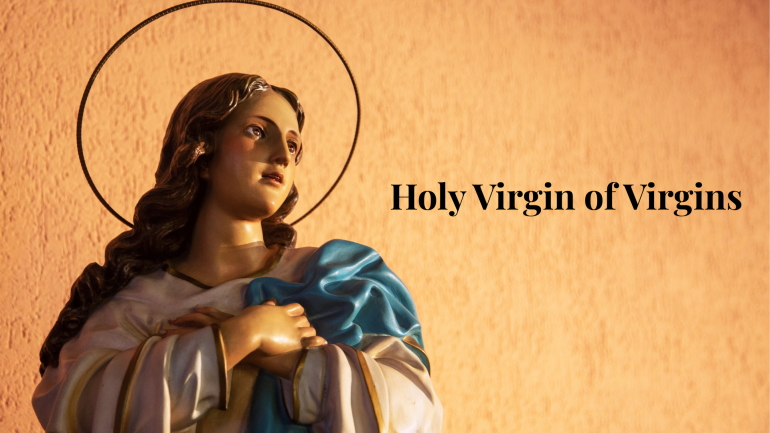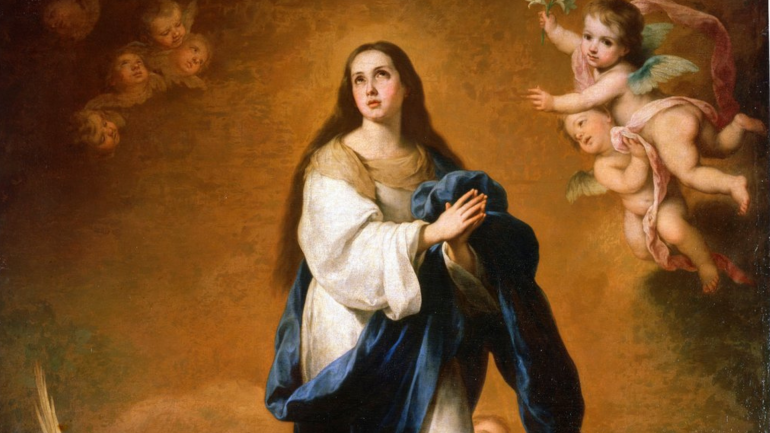Holy Virgin of Virgins

Positioned at the threshold of the Marian invocations in the Litany of the Blessed Virgin Mary, the title ‘Holy Virgin of Virgins’ is more than an accolade. It is the very foundation of Mary’s identity and mission. This invocation affirms Mary as the supreme model of a life wholly consecrated to God, an example for all who seek to live a chaste life of devoted surrender.
Virginity in Scripture
The word ‘Virgin’ is the English translation of the Hebrew term ‘bethulah,’ which denotes a woman who lives a chaste life, a life of physical virginity and moral purity, lived in obedience and fidelity within the house of her father until marriage. Ancient Israel placed importance on virginity as an essential condition for marriage. In Israelite thought, virginity was not only a physical state but also a moral and covenantal virtue, a sign of fidelity to the covenant between Israel and God. In 2 Kings 19:21, the city of Jerusalem and its inhabitants are referred to as the ‘Virgin Daughter of Zion.’ The image conveys a threefold truth: the purity of Jerusalem as the chosen city of God, its inviolability under divine protection, and its faithfulness to the covenant. Thus, virginity becomes a symbol of Israel’s fidelity to God.
The prophetic vision of covenant fidelity reaches its deepest expression in Jeremiah 31:4: “I will build you up again, and you, Virgin Israel, will be rebuilt.” After the destruction of Jerusalem and exile in Babylon, God promises restoration. Here, “Virgin Israel” signifies not merely the physical rebuilding of the nation but a deeper renewal, the restoration of purity, fidelity, and joyful covenant relationship with God.
Covenant Virginity
Going beyond the physical, the concept of Mary’s virginity denotes her total, undivided, and unwavering consecration to God. By proclaiming her the ‘Virgin of Virgins,’ the Litany designates Mary as the supreme model of all consecrated purity. The litany continues to invoke Mary with related titles such as ‘Virgin Most Prudent,’ ‘Virgin Most Venerable,’ ‘Virgin Most Renowned,’ ‘Virgin Most Powerful,’ ‘Virgin Most Merciful,’ and ‘Virgin Most Faithful.’
Together, these titles paint a portrait of the Blessed Virgin not merely as a living icon of a heart wholly given to God. To contemplate Mary under these invocations is to behold her as the ‘Queen of Virgins,’ the ‘Mother Inviolate,’ the ‘Mother Undefiled,’ the ‘Mother Most Chaste,’ and therefore the ‘Mother Most Pure.’ In this way, the title ‘Holy Virgin of Virgins’ encompasses a range of virtues associated with purity and fidelity, a radiant model for all who seek to offer their lives as a complete gift to God.
Scriptural Foundation of Mary’s Virginity
The notion of Mary’s virginity finds its firm foundation in Scripture, particularly in the prophecy of Isaiah 7:14: “Behold, a virgin shall conceive and bear a son, and shall call his name Immanuel.” This prophecy finds its fulfillment in the Annunciation (Luke 1:34–35). When Mary asks angel Gabriel, “How will this be … since I am a virgin?” she reveals her prior resolve to live in perpetual virginity. Gabriel’s reply, “The Holy Spirit will come on you, and the power of the Most High will overshadow you,” unveils the divine initiative by which she conceives while remaining a virgin.
In this sacred moment, Mary’s fiat, “May your word to me be fulfilled,” becomes the pivotal act of salvation history. Her pure and obedient heart transforms her into the living sanctuary of the Word made flesh, revealing that true fruitfulness flows not from human desire but from complete self-surrender to God, the very essence of virginal holiness.

Church Fathers
In 1 Corinthians 7:35, St. Paul praises virginity as a way to “live in a right way in undivided devotion to the Lord.” The doctrine of the perpetual virginity of Mary, before, during, and after the birth of Christ, was solemnly affirmed by the Lateran Council of 649. It is deeply rooted in the teaching of the Church Fathers, who held that her virginity is intimately connected to the mystery of the Incarnation. St. Augustine, for example, wrote: Mary remained a virgin in conceiving her Son, a virgin in giving birth to Him, a virgin in carrying Him, and a virgin in nursing Him at her breast, always a virgin.”
Guardian of Virgins
In the early Christian community in Syria, there was a group of consecrated virgins, known as the ‘Daughters of the Covenant.’ Their veil, ring, and crown were regarded as symbols of their spiritual espousal to Christ, their Heavenly Bridegroom. As religious orders developed and convents flourished through the centuries, the image of Mary as the Illustrious Guardian of Virgins became central in liturgy and devotion. In her, consecrated virgins and all who seek holiness through chastity find their protector, model, and intercessor. Mary continues to inspire women and men alike to embrace lives of total consecration to God. For the consecrated, she is the Queen of Virgins, mothering them into spiritual maturity and guarding their vows.
Sign of Consecration
In a world marked by fragmentation and the commodification of the body, Mary, the ‘Holy Virgin of Virgins,’ shines forth as a luminous counter-sign. Her life reveals that chastity is not suppression but freedom, the freedom to love God wholly and without reservation. Through her, the Church proclaims that the integrity of the human person, body and soul, is sacred, and that every life is called to live in the light of this truth.
To invoke Mary as the Holy Virgin of Virgins is to behold the radiant summit of sanctity: a woman whose entire being was an open dwelling for God. Mary remains forever the mirror of perfect discipleship, the tender guardian of the consecrated, and the Queen of all who seek to love with an undivided heart.
In this light, we cherish the prayer of St. Gertrude the Great as a heartfelt aspiration:
“O my Jesus,
Thou one desire of my heart, commend and consign me to Thy Mother, the virginal and sovereign Rose.
May She ever be, for love of Thee, the guide and the keeper of my virginity.”








